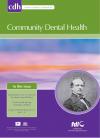Community Dental Health

- Cover Date:
- December 2007
- Print ISSN:
- 0265 539X
- Vol:
- 24
- Issue:
- 4
Editorial - The STROBE initiative and its implications for dental public health research
In recent years, an armoury of guidelines and checklists has been produced to assist researchers in the conduct and reporting of biomedical studies. The information contained in these publications has been of considerable benefit to the scientific community and interested clinicians, and has greatly enhanced the drive towards evidence-based clinical practice. The material is the outcome of deliberations by groups of leading authorities, closely involved in the various types of experimental, descriptive and review studies covered, and in their reporting and publication. It represents a repository of expertise that only existed fragmentarily hitherto. The intention of the producers of the various documents, and the leading biomedical journals to which many of them are affiliated, is to ensure that published material is the soundest and most reliable available, and to refine and codify the reporting of the advances taking place continually in the biomedical field. The principles put forward, aimed at setting standards and determining courses of action in the conduct and reporting of research, are making a major contribution to systematising investigations into the distribution of diseases and disorders in human populations and their determinants. Important among the collection of manuals, working documents and guidelines hitherto published are those concerned with the reporting of randomised controlled trials (RCT), exemplified by the CONSORT statement (Altman, 1996); those dealing with the conduct and reporting of meta-analyses, notably the QUORUM statement – Quality of Reporting of Meta-analyses (Clarke, 2000); those covering systematic reviews of RCTs, specifically the guidelines and training manuals (including the QUORUM statement) promulgated by the Cochrane Collaboration, www.cochrane.org, (named after the celebrated medical epidemiologist who inspired its creation); and those advising on the conduct and reporting of systematic reviews of both RCTs and observational studies (NHS Centre for Reviews and Dissemination, 2001). The authors of these documents have an ongoing interest in revisiting and updating them. They come together regularly to review feed back from interested outside parties and to reconsider and modify their published guidance. A revised version of the CONSORT statement for the reporting of parallel-group randomised trials, for example, appeared in 2000 and it is understood a further version is in development. Lately the list has been joined by STROBE – the statement on Strengthening the Reporting of Observational Studies in Epidemiology. (Elm et al., in press) - which promises to further improve the reporting of clinical research and perhaps broaden the range of material acknowledged as being of intrinsic scientific worth. As its name implies, the outcome of the initiative consists essentially of an inventory and checklist of items that should be addressed in the reporting of analytical epidemiological studies. It represents the first set of guidelines of this type devoted exclusively to the reporting of observational studies as opposed to RCTs or systematic reviews. Taking into account empirical evidence and theoretical considerations, the authors have concentrated on the three main study designs: cohort, case-control and crosssectional investigations. The group of European and North American methodologists, researchers and editors responsible for developing STROBE initially approached the task by obtaining funding for an inaugural workshop in 2004 and the setting up of a website, www.strobe-statement.org. Their modus operandi thereafter involved the searching of textbooks, bibliographic databases, reference lists and personal files for relevant material, including previous recommendations, empirical studies of reporting and articles describing pertinent methodological research. The statement is underpinned by a 69 page back-up document providing explanation and elaboration of the group’s recommendations (Vandenbroucke et al., 2007) with supporting examples from published studies illustrating good practice in various aspects of the reporting process. The authors noted that much clinical or public health knowledge comes from observational research with about nine of ten papers published in clinical specialty journals being devoted to observational research. However, in their opinion, the current reporting of observational studies is often of insufficient quality. They believe furthermore that poor reporting hampers the assessment of the strengths and weaknesses of a study and the generalisability of its results. The workshop and the subsequent iterative process of consultation and revision resulted in a checklist of 22 items (the STROBE statement) that relate to the title, abstract, introduction, methods, results and discussion sections of articles. Eighteen items are common to cohort studies, case-control studies and cross-sectional studies and four are specific to each of these study designs. The authors stress that the intention is solely to provide guidance on how to report observational research well. The recommendations are not to be seen as prescriptions for designing or conducting studies, and while clarity of
Correspondence to: Professor Martin Downer, 16A Westbury Park, Westbury Park, Bristol BS6 7JA, UK. E-mail martindowner@btinternet.com.
- Article Price
- £15.00
- Institution Article Price
- £
- Page Start
- 194
- Page End
- 197
- Authors
Articles from this issue
- Title
- Pg. Start
- Pg. End
- Evaluation of the Parental Perceptions Questionnaire, a component of the COHQoL, for use in the UK.
- 198
- 204
- Private dental health expenditure in Greece by region and income: comparison between the years 1987 and 1998.
- 216
- 216
- Dental caries prevalence among adults in Denmark – the impact of socio-demographic factors and use of oral health services
- 225
- 232
- The effect of advance telephone prompting in a survey of general dental practitioners in Scotland: A randomised controlled trial
- 233
- 237
- Short Communication - Caries prevalence and location and dental treatment needs in preschoolers in Athens – GENESIS Project
- 264
- 267
